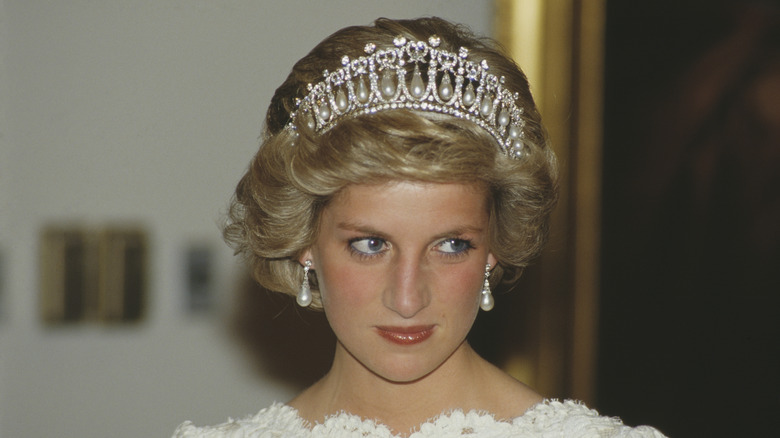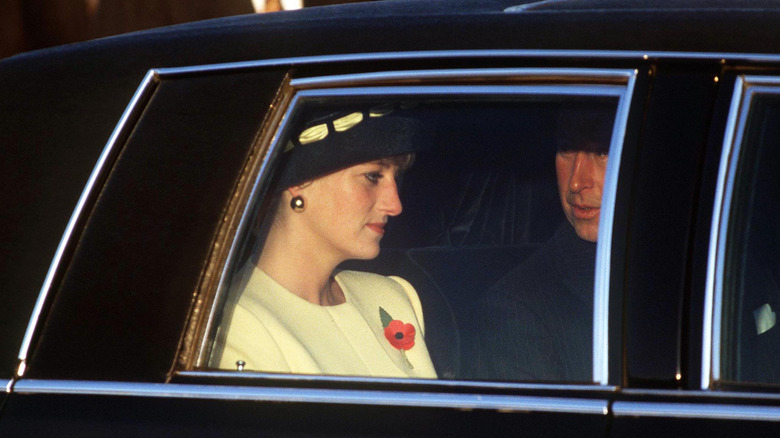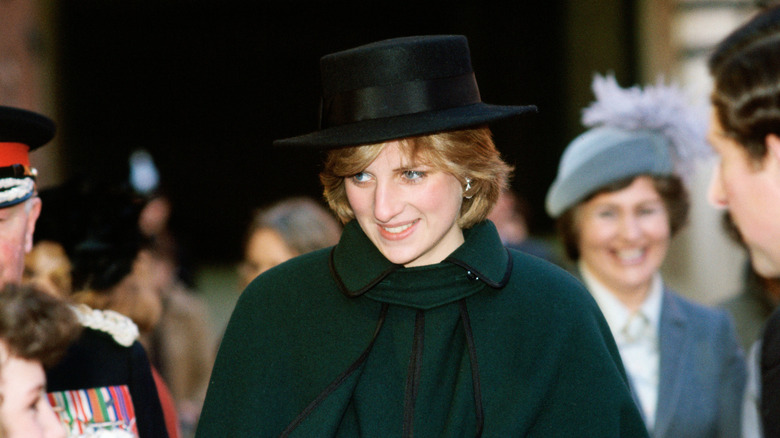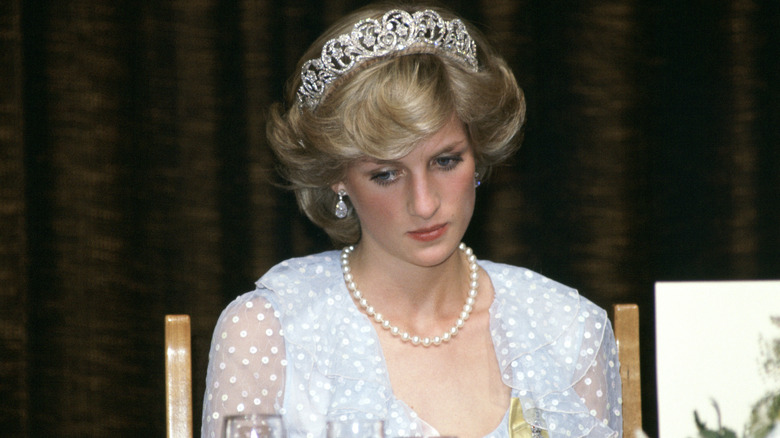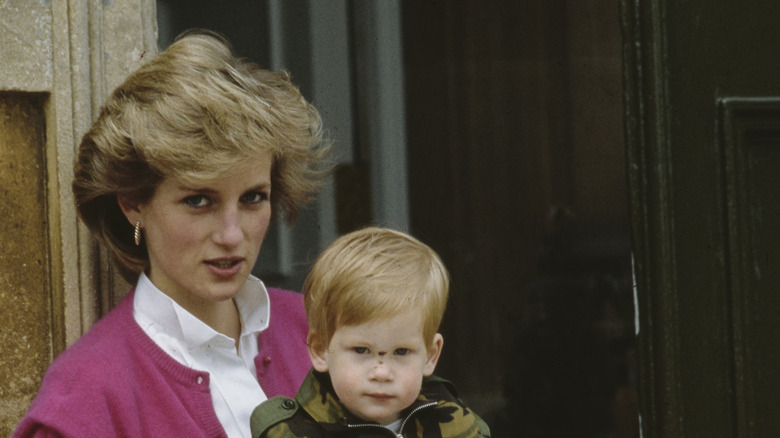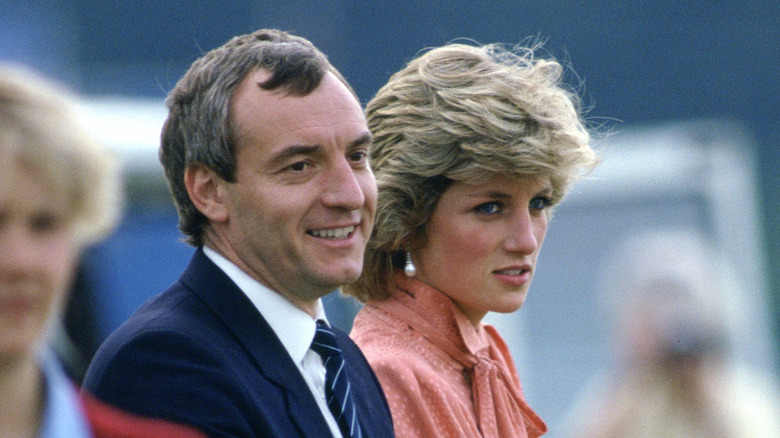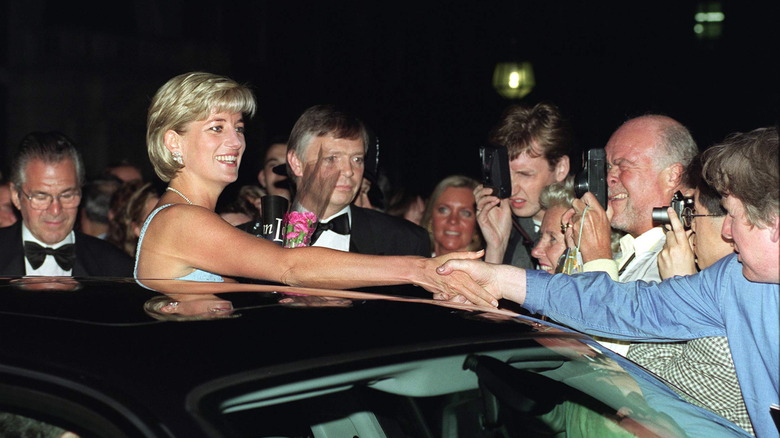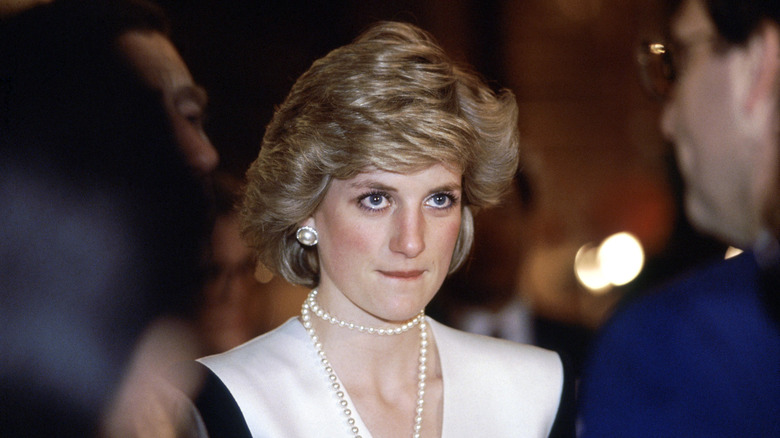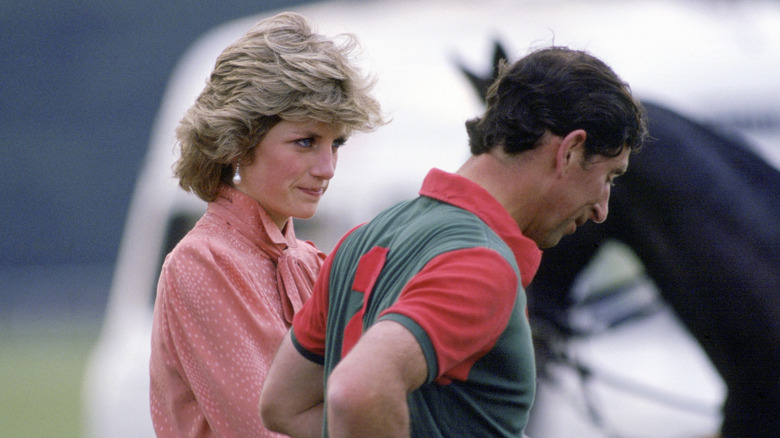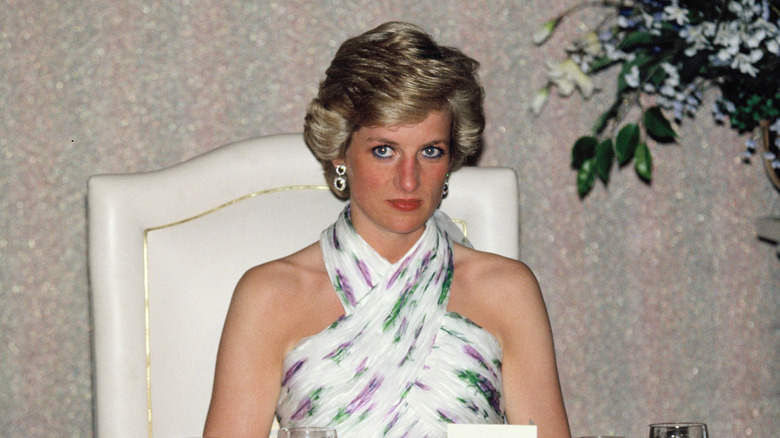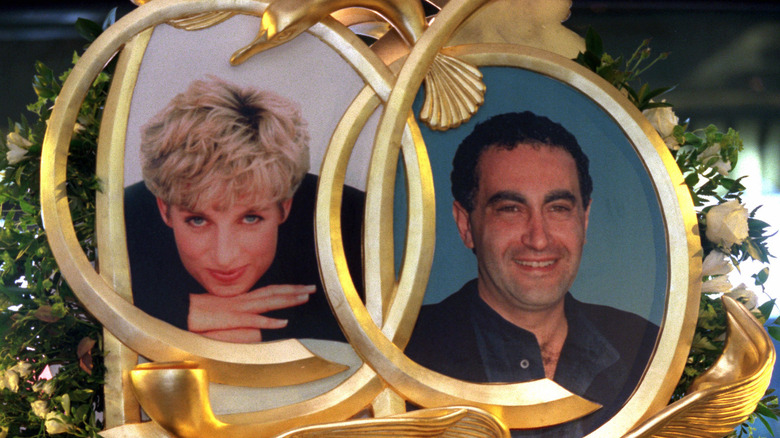10 Rumors About Princess Diana That Are Still Swirling After Her Death
Princess Diana wasn't known as the people's princess for nothing. Even 28 years after her death, the myth and legend of the Princess of Wales continues to thrive in public imagination, especially the details surrounding the tragic end of her life. From whispers about a secret engagement to her boyfriend Dodi Fayed to claims that she was pregnant during her fatal car crash in Paris to the more outlandish theories questioning her son's paternity, conspiracy theories abound in the curious case of the Princess of Wales. Perhaps the most enduring of these is the larger claim in which most other theories are subsumed: Diana was murdered.
The idea directly contests official investigations that turned up nothing to indicate foul play and court rulings that deemed her death a case of unlawful killing. But reported facts have done little to quell conspiracy theories. People's preoccupation with trying to sniff out what exactly happened to the beloved princess can be linked to general fascination with not just her life, but the British royal institution as a whole. As Edward White, author of "Dianaworld: An Obsession," told Forbes: "[T]here are so many stories that are not yet finished with Diana. So many of the things that people don't know, because the royal family still operates with enormous secrecy."
Here are 10 rumors about Princess Diana's life and times that are still swirling after her death.
Princess Diana's death was not an accident
The biggest conspiracy surrounding Princess Diana's death is the event of the death itself, which many people around the world still believe was more a murder than an accident. According to the official story, the Princess of Wales was in a fatal car crash on August 31, 1997, when the Mercedes she was in crashed inside a tunnel in Paris. Diana, who was in the car with three others, including her partner at the time, Dodi Fayed, was apparently trying to escape the hot pursuit of paparazzi — at least that's what immediate reports suggested. But considering the highly publicized circumstances of Diana's divorce from King Charles III and the turbulence it stirred in royal quarters, not everyone was convinced that the tragedy was as straightforward as it seemed.
Several supposed inconsistencies in the story — from the missing CCTV footage all along the way from the Ritz Hotel to the Pont de l'Alma tunnel, to the suspiciously high levels of alcohol in the driver Henri Paul's blood — have given rise to the idea that Diana's death was allegedly premeditated, most likely by the royal family, in collusion with British intelligence services. Unsurprisingly, MI6 has denied the charge. Official investigations named Paul and the paparazzi for the incident. Fayed's father and Harrods owner Mohamed Al-Fayed emerged as one of the loudest voices challenging the official findings, claiming that his son's relationship with Diana threatened the reputation of the British monarchy.
The Princess of Wales was pregnant at the time of her death
Almost 30 years after that fatal car crash in Paris, conspiracy theories continue to persist that Princess Diana was pregnant at the time of her death. The theory surfaced soon after the tragedy and over the years, took on a life of its own, complete with conflicting but equally intriguing narratives. A lot of the input on the sensational matter came from French authorities, who launched initial investigations into the beloved British princess' death.
A top police officer with access to classified medical documents, for instance, told the Independent in 2003 that Diana was indeed carrying a child and pointed to "a cover-up of sorts." Noted businessman and Dodi Fayed's father Mohamed Al-Fayed was also responsible for pushing the conspiracy theory forward, claiming that the couple themselves had called to inform him about it shortly before their deaths. He argued that the pregnancy was a key motive behind what he believed was a deliberate plot to kill the couple.
The credibility of the rumor came under question when British authorities took over the case of Diana's death under Operation Paget, probing the conspiracy theories around the car crash in particular. Right in the first chapter of the official inquiry report, as published by the BBC, the burning question of Diana's alleged pregnancy was addressed and refuted, citing multiple sources. The investigation, however, has done little to quell the notorious theory that continues to be attached to Diana's legacy.
She already knew she was going to die
One of the most chilling conspiracy theories surrounding that fatal car accident in Paris in 1997 alludes to the idea that long before her death, Princess Diana knew that her life was in danger. The theory ties in with a purported piece of evidence called "The Mishcon Note," which recorded a conversation between the Princess of Wales and her lawyer Victor Mishcon, who was notably part of the legal team managing her divorce proceedings.
During a meeting with Mishcon in 1995, Diana reportedly brought up the subject of her impending death and said, citing sources, that efforts were underway to "get rid of her" — something Mishcon apparently took note of in his documents. What's more, Diana seemed to have predicted the manner of her death with terrifying accuracy and mentioned a car crash. The infamous Mishcon Note was eventually relayed to the British police, who looked into its validity. But it appears that conspiracy theorists found more value in it than investigators did.
That said, the idea that Diana knew what was coming is also rooted in a letter Diana allegedly wrote in October 1996, months before her death. The letter, which has been quoted across books written by her former butler Paul Burrell and journalist Christopher Andersen, mentioned: "My husband is planning an accident in my car, brake failure and serious head injury in order to make the path clear for Charles to marry" (via ABC News).
Prince Harry is actually her son with her lover James Hewitt
A look back at Princess Diana's life can never be complete without the (usually) contentious mention of James Hewitt. Hewitt is a former army officer with a decorated military tenure. But he holds distinction in common public memory for more than just his service because he is also famous as a past lover of the Princess of Wales. While the illicit Diana-Hewitt love affair is scandalous as a stand-alone chapter in royal history, considering that it happened when Diana was still married to King Charles III, there is a deeper, more sinister conspiracy theory that goes beyond their controversial romance. The long-held rumor contends that Prince Harry is not actually King Charles III's son and can trace his paternity to Hewitt instead.
Among the sparks for this explosive theory is the apparently striking resemblance between Hewitt and Harry, especially their unmistakable red hair. Interestingly, their likeness seems to have such a stronghold in public imagination that the disparity in timelines — of Harry's birth in 1984 and Diana's first meeting with Hewitt in 1986 — has done little to squash the theory. Nor has it mattered that Hewitt himself has refuted the claim. In fact, so plausible has the rumor been for some that even Harry has admitted to questioning his lineage. In his book "Spare," he wrote about how Charles joked about the subject and used to tell him: "Who knows if I'm even your real father? Maybe your real father is in Broadmoor, darling boy!"
Princess Diana had an affair with her bodyguard
Barry Mannakee stands out as one of the most intriguing names in Princess Diana's roster of lovers. Mannakee was a member of her security detail in the mid-1980s, a period when her marriage to King Charles III had started to buckle, and he showed up as a steady, reassuring presence in the troubled princess' daily life. Like the Princess of Wales, Mannakee too was married. He was also a father of two. But their respective domestic situations didn't stop either of them from developing a deep connection outside the purview of their spouses.
"I was always wandering around trying to see him," Diana said about Mannakee, in tapes recorded by Peter Settelen in the '90s (via NBC News). "[I] was only happy when he was around. ... I was like a little girl in front of him the whole time, desperate for praise," she said, adding that with Mannakee, she found the kind of intimacy that had gone missing in her marriage.
Their growing relationship didn't go unnoticed by the higher-ups, and in 1986, after just a year of being assigned to Diana, he was transferred to a different department. As if the subject of their forbidden romance wasn't controversial enough, in 1987, Mannakee tragically died in a road accident — an event that has been shrouded in a mystery of its own. Many believe Mannakee was killed for toeing the line, a view shared by Diana, who said on record: "I think he was bumped off."
She leaked sensitive royal information to the press
Among the most complicated relationships Princess Diana shared was with the British media. From the moment she entered the royal family, the press was all over her, digging into the deepest details of her life and helping shape her persona as a princess of the masses. That fascination continued up until Diana's death, which, in mainstream dialogue, was a tragic but ironic result of the press loving her a little too much. However, after 1997, some explosive revelations about the inner workings of Diana's love-hate relationship with the British press came to light.
It was widely reported that the Princess of Wales had a clever understanding of how optics worked and often used the media to manipulate her public image. "It is an undisputed fact that the Princess connived with the media and exploited it for her own interests ... just as much as we exploited her for ours," editor-journalist Sir David English once said (via Vanity Fair).
Notwithstanding the popular narrative that she was forever disturbed by them, Diana shared an apparently symbiotic relationship with the press and even went so far as to feed them information. In a 2014 court hearing, a former News of the World editor claimed to have received a confidential royal phone directory from Diana in the '90s, when her marriage was on the rocks and she wanted to tip the scales in her favor.
Princess Diana's phone was tapped by British intelligence agencies
Amid the high-octane drama unfolding within the monarchy in the '90s, Princess Diana's private life had become public property to concerning degrees. Case in point: Squidgygate. The royal phone-tapping scandal exploded in 1992, when calls between Diana and her friend James Gilbey were leaked by tabloids. The Sun was first to publish the calls, which recorded Gilbey affectionately referring to the princess as "Squidgy," giving the sensation its enduring name.
Speculation around the circumstances of the leak was intense and varied. The theory of amateur radio enthusiasts accidentally picking up on the call's frequency was pushed forward, but many royal commentators believed that this was more than just a case of arbitrary eavesdropping. The hypothesis was fueled further years later at Diana's inquest, where the princess' bodyguard Ken Wharfe alleged the involvement of British intelligence agencies in tapping her phone.
"It's my belief this internal recording was probably made by GCHQ," he told the court in 2008, referring to the Government Communications Headquarters, which strongly denied his claims (via The Guardian). Wharfe's testimony raised doubts over whether Diana's call was accidentally intercepted or was deliberately put on the airwaves to be found. According to her staff members, Diana's concerns about her calls being hacked went beyond Squidgygate, and in the months before her death, she was convinced that her phone was bugged. Some theories also contend that American secret services were involved in the alleged tapping of Diana's phone.
She wanted to relocate to America
Prince Harry and Meghan Markle's decision to leave the British royal family and move to the United States sent shock waves around the world in 2022. Radical as it was, it was hardly an original thought. Decades before Harry's explosive walkout, his mother Princess Diana had toyed with a similar idea of relocating to America, if certain accounts are to be believed.
In the years before her death, the Princess of Wales had apparently spoken consistently about her desire to start afresh across the Atlantic. "There is nothing I can do in the U.K. The papers there attack me no matter what I do," her former security officer Lee Sansum recalled her saying in his book "Protecting Diana: A Bodyguard's Story" (via Page Six). Diana's desperation to get away from her home country seemed to have been an open secret among her immediate circle, with her brother Charles Spencer boldly reiterating her tragic desire at her funeral in 1997.
Her children were a key reason why Diana didn't actually see her plan to migrate westward through. Daily Mail correspondent Richard Kay, who was one of the princess' closest friends, suggested that Diana's access to her sons might have been at risk if she took off. "They were young boys, and I don't think she had quite worked out how she could live in New York or California, for example, and maintain that close contact that she needed to have with William and Harry," he said.
Princess Diana had a tape that documented an alleged assault in the royal household
Life inside the palace has always been tightly guarded, but every so often, sensational stories about royal family cover-ups slip through the cracks. Among the more disturbing of such legends is one involving a secret recording Princess Diana supposedly made before her death. The contents of the notorious tape, which was part of Diana's stash of belongings taken by her former butler Paul Burrell after her death, are said to have documented alleged incidents of sexual assault within the royal household. According to Vanity Fair, the accuser was a male member of the royal staff who claimed to have been raped twice by an aide close to King Charles III.
When the survivor recounted his ordeals to Diana, she apparently taped him without his knowledge. The existence of the tape became public knowledge in the early 2000s, when Burrell was on trial for alleged theft of the late princess' items. Interestingly, though a lot of Diana's possessions were recovered, the secret tape was never found. Authorities did still investigate the rape claims as part of a larger probe into Burrell's case and spoke to both the accuser and the accused, but there seemed to be no confession of assault, according to The Guardian. A royal spokesperson later stated: "I am not going to get into the detail of personnel handling but I think you can rest assured there was no cover-up at all."
She was engaged to Dodi Fayed before her death
Few rumors surrounding Princess Diana's final days have endured as relentlessly as the one about her supposed engagement to Dodi Fayed. Her romantic relationship with Fayed was one of the most significant in her life, as well as her last one. It began in 1997 when she vacationed with the influential Al-Fayed family in France. Once the press caught whiff of Diana and the Egyptian film producer's whirlwind summer romance, tabloids tailed the story fervently, right up until the fatal car crash that killed them both.
Following the tragedy, the idea that Diana and Fayed were on the brink of marriage captured public imagination, thanks to claims made by those close to the late couple. Many of these suggestions came from Fayed's family, including his sister Joumana Yassin, who told The Herald days after his death, "He did not view her as a princess, but he saw in her a woman he loved and wanted to marry."
In later years, Fayed's father Mohamed Al-Fayed became one of the most vocal proponents of the theory that a proposal had already taken place between his son and the Princess of Wales. Even a storyline on "The Crown" seemed to support the thesis. Though opinions on the matter are conflicted, one facet of the conspiracy was confirmed during an inquest into Diana's death in 2007: Fayed had indeed purchased a ring for his ladylove. On it were the words "tell me yes" inscribed in French.
